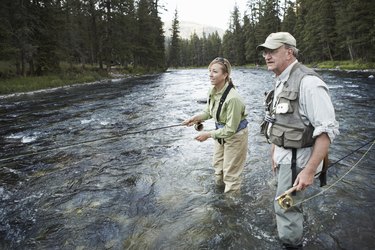
Directly or indirectly, water affects all facets of life. Without it, there would be no vegetation on land, no oxygen for animals to breathe and the planet would look entirely different than it does today. Water is necessary keep people's bodies and the environment healthy and should be valued and protected as the precious resource it is.
Oxygen
Video of the Day
Plants deserve appreciation for producing breathable air and for what they are able to do with water. Through a series of biochemical reactions, plants are able to convert two water molecules (two hydrogen atoms and one oxygen atom in each molecule) into oxygen. On land, this process is almost entirely counteracted by decomposition, through which soil microorganisms consume oxygen and return dead organic matter back to the atmosphere as carbon dioxide. However, oxygen is also produced by algae in the ocean, and as they die and sink to the bottom of the ocean, their biomass is not decomposed through an oxygen-consuming process. This burial of ocean algae is what is thought to have lead to the original oxygenation of our atmosphere.
Video of the Day
Weather
Global patterns of weather and precipitation are dictated by the movement, quantity and temperature of water, both in the ocean and in the atmosphere. As water vapor circulates through the atmosphere and into the oceans, it alters the temperature and pressure, resulting in wind and currents. As ocean currents move from the equator north and south to the poles, the water cools. The distribution in ocean temperature directly affects regional climate patterns. Because plants and animals have specific environmental requirements, temperature and rainfall determine that species are able to survive in a given location.
Agriculture
Americans depend on farmers to produce enough food to feed our increasing population. Aside from the vegetables on our plates, corn products are used in a variety of foods common to every supermarket. Ethanol extracted from corn has even been used as an alternative fuel. All of these everyday items rely directly on the amount of water they receive. Water is responsible for photosynthesis, which produces breathable oxygen, and also gives plants the vigor required to sustain their weight. Not enough water and the plants become stressed and eventually die. Too much water and the plants drown in the soil.
Fisheries
Just as humans require clean drinking water to maintain our health, fish and other aquatic organisms need clean water to survive. Water contaminated with mercury, polychlorinated biphenyls, PCBs, and other toxins can accumulate in the tissue of fish, which then gets transferred to humans during consumption. In September 2009, the U.S. Environmental Protection Agency released its Report on Fish Contamination in U.S. Lakes and Reservoirs. Their study found that nearly half of the sample lakes and reservoirs contained fish with mercury levels considered toxic to humans.
Sustainability
Because of the reliance on water to provide so many basic needs, water sustainability and conservation have been becoming increasingly important. Government bodies such as the U.S. Environmental Protection Agency and the U.S. Geological Survey are continuously monitoring streams, lakes, rivers and groundwater to ensure the highest quality drinking water for public health, to minimize environmental degradation and to improve efficiency in waste-water treatment.